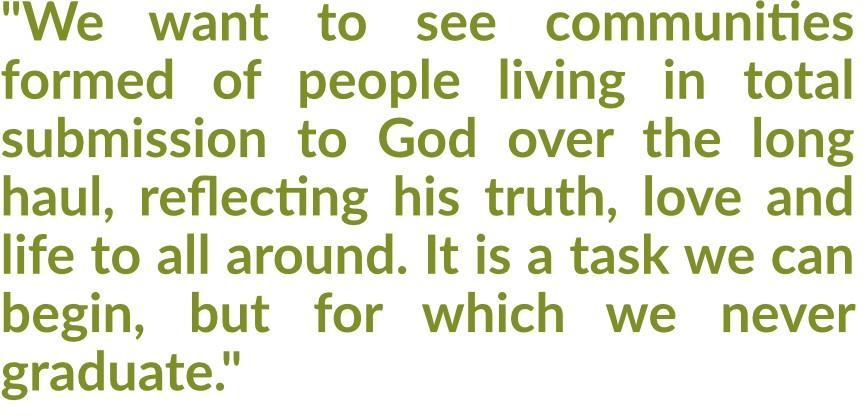
The Living God
Over the past year we have walked through the Torah together. Torah is about instruction and guidance, helping us to truly become God’s people. But it is not just a series of laws or a philosophical approach to theology; rather, as Jonathan Sacks states, it is “truth as story”. Torah helps us understand how God is working in and through history, but also in us, his people; it is cosmic in scale, and yet also personal. As God works in creation, redemption, consecration of a people, transforming and creating a new community, he simultaneously challenges each new generation to respond to his calling, revelation, invitation, correction, and his commission.
But is this still relevant today? And can we legitimately appl y its teachings to the area of mission? I would argue it is particularly important for our understanding of mission, precisely because mission is intrinsically linked with our identity. That said, “mission” is a large category. So in this final summary of Torah as a whole, I would like to examine how it helps in our understanding of church planting ministry, which is (or should be) ultimately the goal of all mission endeavour.
y its teachings to the area of mission? I would argue it is particularly important for our understanding of mission, precisely because mission is intrinsically linked with our identity. That said, “mission” is a large category. So in this final summary of Torah as a whole, I would like to examine how it helps in our understanding of church planting ministry, which is (or should be) ultimately the goal of all mission endeavour.
But a caveat. Much writing on church planting simply focusses on techniques and strategies. If this is what we want from Torah, we will be disappointed. The wise man may build on the rock, but his wisdom is still shown in taking the necessary time and effort to build a solid foundation. The term “church-planting” may be unhelpful unless we carefully define what we mean. We are certainly not referring to buildings, nor to necessary church structures. And while we rightly rejoice to see new churches constituted, even this is just a starting point, not the end goal. We want to see communities formed of people living in total submission to God over the long haul, reflecting his truth, love, and life to all around. It is a task we can begin, but from which we never graduate. It is when viewing the whole process of church foundation and formation that Torah can be so informative.
Dependant Living
Firstly, we must rediscover a total dependence on God, who leads us to places where He is our only recourse. Abraham called to leave Mesopotamia, Israel from Egypt, God’s people were constantly moved away from centres of power (and distracting resources). The desert wanderings required daily dependence on God. The fertile “promised land” was still dependent on rainfall from God (Deuteronomy 11:11-12) - no great rivers to provide a sense of security. Geographically it was vulnerable and always sandwiched between empires. For Sacks this led to an important aspect of Israel’s faith- “not security, but the courage to live with insecurity”.
We must learn to cultivate this sense of dependency; otherwise, God will remove much of what we normally rely on to teach us. Decisions on ministry should be guided by God’s leading; sadly today, our perceived resources (or lack of) are often what determine our level of commitment. Not a way to live, says Torah.
Covenant Living
A common problem in today’s church is that many practices seem to flow from a “contract” mentality, i.e. I give something and expect something in return. But mission should never be undertaken in this way. It is a giving of self to God. Torah reminds us constantly that we are a covenant people. Much has been written about similarities between the Sinai covenant and other treaties common to the ancient Near East; but Sacks highlights three unique aspects- that one of the parties is God himself, the entire nation was party to the agreement, and it was to govern the internal life of the people, not just the external. God wants every part of every one of us all the time. Chris Wright reminds us that “the covenant was never a thing of the past, because Yahweh, as the living God, was the contemporary of every succeeding generation” (pg.62). He still is.
How then do we express the reality of being a covenant people in our lives and mission? Firstly, it should never cease to amaze us that God calls us into a loving relationship with himself. Following the episode with the golden calf, to a people who deserved punishment, God reaffirms that he is “abounding in steadfast love” (Exodus 34:6-7). Then Moses in Deuteronomy emphasizes that our lives are to be a response of love which engages every part of our being (6:4-6). One weakness of historic creeds was to emphasize correct belief (rightly so) but without insisting on a visible love response; we must reunite the two. Church planting must have as its aim a people who express such exuberant joyful love of God.
Second, remember we are a covenant PEOPLE, not a grouping of covenant individuals. The mark of this people is love of neighbour and love of the stranger (see Leviticus 19). Mission, and especially the task of church planting, is the highest expression of our covenant people status, where we simultaneously express our love of God and love of others, done in an attitude of total dependence on God. This is true living.
Source/Further Reading:
1996 Paternoster Press, Deuteronomy Chris Wright
2010 Maggid Books, Exodus: The Book of Redemption Jonathan Sacks
2019 Maggid Books, Deuteronomy: Renewal of the Sinai Covenant Jonathan Sack



